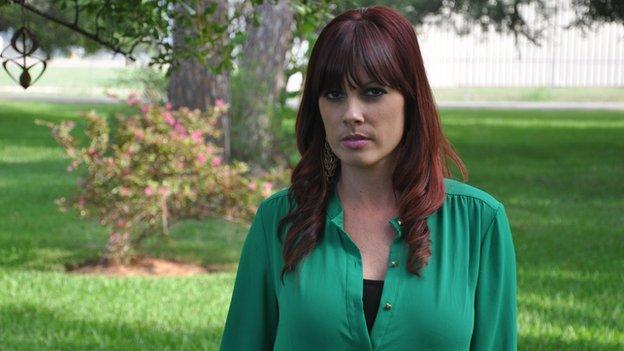Sites must end anonymity to tackle 'revenge porn', say peers
- Published
Lord Best said the penalties for revenge porn offences are to be increased
Social media sites should establish the identity of people opening accounts to crack down on so-called "revenge porn," a House of Lords committee has said.
The peers rejected calls to create a new criminal offence of "revenge porn" because it was covered by existing obscenity and harassment laws.
But they said, external clearer guidance was needed for police and prosecutors to help them secure convictions.
And perpetrators should not be allowed to post in complete anonymity.
"There is little point in criminalising certain behaviour and at the same time legitimately making that same behaviour impossible to detect," the report says.
But it also stresses that the UK government is limited in what it can do because most popular social media sites, such as Facebook and Twitter, are based overseas - and it would take international treaties to force operators to take action on anonymity.
'Extreme cases'
'Revenge porn' is when people post explicit images of ex-partners online to humiliate them following a break-up.
One victim, Hannah, who is 21, told BBC Radio 1's Newsbeat earlier this month she felt "lost and alone" after her ex-boyfriend posted pictures of her on Tumblr but police said there was nothing they could do.
The National Stalking Helpline, Women's Aid and the UK Safer Internet Centre all say the problem has become more common.
It has led to calls from some campaigners, including Liberal Democrat MPs and peers, for the UK to follow the example of a number of states in America, where specific laws aimed at stopping revenge porn have been introduced.
Ministers have acknowledged that revenge porn is a growing problem and say they are open to changing the law if there is public and parliamentary support for such a move.
But the House of Lords Communications Committee said existing legislation and guidelines for prosecutors were adequate to ensure those involved in revenge porn, trolling, cyber bullying and other online offences could be prosecuted.
Revenge porn victim: I trusted him
Although the laws pre-dated the emergence of Facebook, YouTube, Twitter and other outlets, it said prosecutions could be brought under the 2003 Communications Act and the 1997 Protection from Harassment Act.
Lord Best, the crossbench peer who chairs the committee, said: "We don't think it's really about changing the law. There are an awful lot of laws that could be used.
"These are not new offences, it's just that they are offences being expressed in a different way. People are being harassed and persecuted in a different way."
Posting pictures of "extreme sexual acts" was clearly illegal, he added, but the anonymity of users made it difficult to find those responsible.
"In extreme cases, prosecutions must follow and it's no good people hiding behind anonymity here. We need to know who is responsible for offences and get to them," he told BBC Radio 4's Today programme.
Parents and teachers
The report says some social media sites, such as Facebook, require the use of real names but they do not take steps to confirm users' identities. Others, such as Twitter, allow anonymity but challenge impersonation, while others allowed complete anonymity.
It says the operators of sites should establish the identity of users but then allow them to use pseudonyms or post messages anonymously if they wished - but in the meantime there were steps that could be taken to help victims of cyber-bullying and revenge porn.
The report says:
Social media sites should respond quicker when police request information about alleged offenders
Web firms should develop their abuse monitoring and user protection systems
Parents and teachers should make children aware of what is acceptable online behaviour
Statistics on reported online offences should be improved
It also argues that the existing guidelines for prosecutors in England and Wales could be improved.
"The Director of Public Prosecutions' guidance is very good but we would like clarification as to when a person who sends an indecent communication could and should be prosecuted. "said Lord Best.
"We encourage websites to speed up processing law enforcement requests for identities, to develop further their ability to monitor the use of their services and to build on the effectiveness of measures already in place to enable people using social media platforms to protect themselves."
Lib Dem MP Julian Huppert, who has been campaigning for "revenge porn" to be criminalised, said he thought the Lords committee was "wrong" and there was "clearly a gap in the existing laws" that needed to be addressed.
For an offence to count as harassment under existing laws, for example, it had to be done "more than once".
He said there needed to be a new law banning the distribution of explicit images without the subject's consent and although there was no research to indicate the size of the problem, it was clear that "revenge porn" was not a "passing fad that is going to go away in a couple of years" and it caused "real harm" to victims. He said he hoped legislation would still be passed.
'High threshold'
Guidelines published by former DPP Keir Starmer made a distinction between communications "that should be robustly prosecuted, such as those that amount to a credible threat of violence, a targeted campaign of harassment against an individual or which breach court orders, and those communications which may be considered "merely offensive and grossly offensive".

The Director of Public Prosecutions published guidelines on social media communications last year
There should be a "high threshold", he said, for prosecution of cases involving communications considered grossly offensive, indecent, obscene or false as a recognition of the "chilling effect" that the standard prosecution of such cases could have on freedom of expression.
Two peers, Lord Marks and Baroness Grender, have put forward an amendment to the government's Criminal Justice and Courts Bill which would allow for a one-year jail term for the publication of explicit images of ex-partners without their knowledge and consent.
Legislation criminalising the practice has been introduced in the US states of Texas, Utah, Wisconsin, New York, Maryland, California and New Jersey.
However, the laws in California do not cover self-taken shots, which some campaigners claim may represent up to 80% of all revenge porn.
- Published2 July 2014

- Published3 April 2014

- Published2 July 2014

- Published11 December 2013
